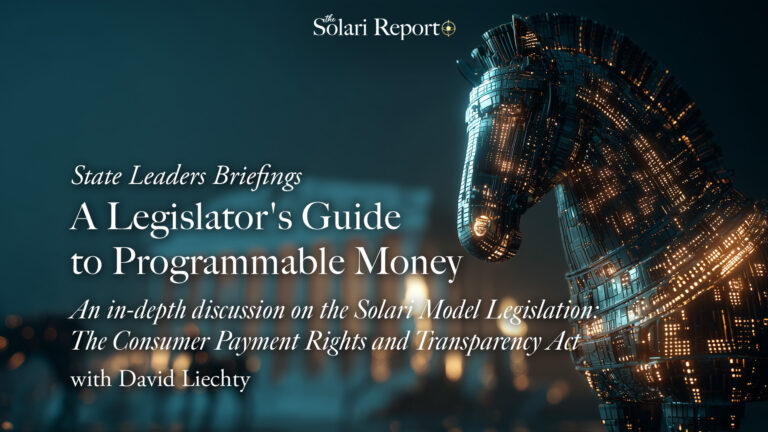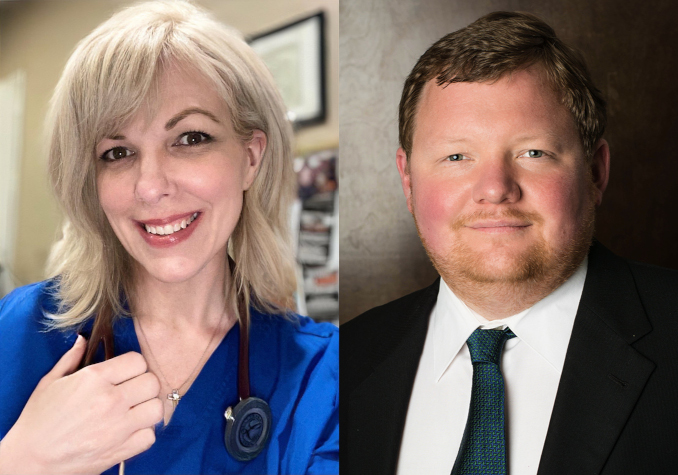A Short Preview (Login to Access the Full Interview):
“I will use those dietary regimens which will benefit my patients according to my greatest ability and judgement, and I will do no harm or injustice to them. I will not give a lethal drug to anyone if I am asked, nor will I advise such a plan; and similarly, I will not give a woman a pessary to cause an abortion.” ~ From the Hippocratic Oath
By Corey Lynn and James White
Sadly, we have reached a point in 2023 in the United States that most Americans would never have imagined possible only a few short years ago. Collectively, many have lost confidence not only in institutional care, but in the practice of modern medicine in general—to the extent that some dread the thought of even going to a hospital.
The good news is that people everywhere are rising to the challenges that we are currently facing in health care—and they are becoming educated on managing not only their own health, but that of their family members. Both of our guests on this edition of the Solution Series—Health Series host Jennifer Walters and attorney Matt Hale—are leading the way in public education and action.
Jennifer is a wife, mom of two boys, and a registered nurse who left the mainstream medical industry after her oldest son was vaccine-injured by his baby shots in 2008. She has dedicated her life to healing her son and helping others do the same.
Matt has been practicing law since 2004, focusing his career on representing people harmed by others’ negligent acts. For almost 20 years, Matt has successfully litigated complex injury claims, including medical malpractice claims against large medical systems and medical providers. He is often brought into cases by other attorneys, who need additional expertise in medical injury claims.
In this power-packed episode, learn strategies to manage your health and protect yourself legally.
Money & Markets
This is the last week of the month, so there is no Money & Markets. The next Money & Markets will publish on February 2. Post questions for Catherine or John Titus at the Money & Markets commentary here.
Related Solari Reports:
The Inspiration to Take Action with Jennifer Walters
Faith Over Fear, A Nurse’s Fight to Save Lives with Nicole Sirotek, BSN, RN
Musings on Health, Health Care and Health Insurance
Solari Report Forms for COVID-19 Injections (downloadable PDFs)
Related Resources:
American Frontline Nurses (Nicole Sirotek, founder)
Instructional videos (how-to’s on dosing, nebulizer or pulse oximeter use, and much more) (American Frontline Nurses)
Patient Toolbox (Citizens’ Council for Health Freedom)
Accident Insurance (AAA)
Covid-19 Resources: Medical, Legal, Forms, Job Boards & Other Critical Information (Corey’s Digs)
Health Sharing Ministries and Alternative Plans:
Health Care Sharing Ministries Comparison Chart
Doctors and Facilities Accepting Direct Payment:
Association of American Physicians and Surgeons (AAPS)
Find a Direct Payment / Cash Friendly Practice
Surgery Centers with Cash-Friendly Pricing
Opting Out of Medicare: A Guide for Physicians
Health Care Lies: Stop the National Patient ID!
Citizen’s Council for Health Freedom (CCHF)
CCHF Coalition Letter to Stop the National Patient ID
The HIPAA Deception: Why HIPAA Is Not a Privacy Law with Twila Brase
Books:
Big Brother in the Exam Room: The Dangerous Truth about Electronic Health Records by Twila Brase, RN, PHN
The Grow System: The Essential Guide to Modern Self-Sufficient Living—from Growing Food to Making Medicine by Marjory Wildcraft
The Best Family Homeopathy Acute Care Manual: A Pictorial Guide to First Aid and Acute Therapeutics by Kate Birch
The Survival Medicine Handbook: The Essential Guide for When Help Is NOT on the Way (4th edition), by Joseph Alton, MD and Amy Alton, APRN
Common Sense Medicine: Restoring the Patient/Physician Relationship by Jeff Danby
Davis’s Drug Guide for Nurses by April Hazard Vallerand and Cynthia A. Sanoski
Physicians’ Desk Reference (used copies available on eBay, ThriftBooks, Chegg, and other sites)





















































































































Hello Miss Cory, I realized 27 yrs ago at age 40 the health care sys was failing. I was falling apart and sick as a dog, dr wanted to give statins and more, told me my bones and joints hurting were due to my age and would have to take meds the rest of my life, bone dr wanted to do neck surgery, nope never went back. Instead God sent a computer guy to start me on my journey learning food and health. Yes 27 yrs of study, way over 100 books, thousands of hrs of vids. Mostly self taught. Age 67 now bones and joints fine, BP 108 over 70 no meds, resolved my prediabetes with diet only, down 43 lbs, I eat 100 percent animal, no veggies or fruit. Any of us can be so very much more healthy. To quote Dr Sarah Hallberg DO, don’t follow the guide lines. Her 5 yr study on reversing type 2 diabetes is land mark, but ADA want teach low carb or very low carb. Easy to understand why. If we want to find how to be healthy we can. First step break our carb addiction.
Jimmy, I am so proud of you! Yes, we can each find what works for our health if we are willing to put in the time for the research. Recently I have been running into multiple patients for post-op care with implantable devices for blood glucose monitoring. Diabetes care in certain hospital programs are telling extremely overweight people that their weight is not the cause of their type 2 diabetes, that they are “destined for diabetes with their genes”. Then they are talked into an implanted device that monitors blood sugar and some even an insulin pump. Then they must live each day using an app that tracks their bodily reactions and I think it can tell where you are or if you are asleep…UGH. I can’t imagine how implants and tracking will help anyone with type 2 diabetes, plus I am pretty sure the EMF isn’t helping them to feel better. You took your health into your own hands and are an inspiration to us all! God Bless, Jennifer
I wonder about these AI controlled blood sugar management devices too. I don’t know a whole lot about these myself, except to say that I’ve seen diagnosis codes for the failure of these devices in overdosing or underdosing people on insulin. There’s a code for this? I do not understand why anyone would hand over bodily control to a medical device like this. A device that is so prone to fail that there is a code for that failure (I honestly don’t recall whether I saw the failure code as a diagnosis or a procedure code). They tell people that being overweight is genetic too, right before they sell the public on gastric bypass surgeries. I’d warn anyone I care about away from that surgery, personally.
I know numerous people who’ve had the gastric bypass surgery. They may “work” for a year or two, but unless you’re also prepared to make numerous lifestyle changes, the surgery alone is unlikely to help in the medium to long term.
The folks I know have mostly gained back their weight post-surgery, and then some.
Also, much of the weight loss is a result of the prescribed liquid only diet, two weeks prior to, and six weeks after surgery.
My aunt had gastric bypass surgery, she never left the hospital. She was one the best, most positive and happy people I have ever known. She had some type of sepsis and it killed her. It was awful.
Thank you Miss Jennifer. Drs in the low carb world have a saying “genes load the gun but what we eat cocks the hammer and pulls the trigger”. If I look at my grandad and my mom and dad. I was on the same road easy to see ie where I carried my weight, visceral area, not good. We men also have a big problem, we think if we are strong we are healthy, nope. High carb and high triglycerides are harming our liver, kidneys, heart blood flow etc etc etc. Nope don’t feel a thing until boom. I have a good bit of calcium in the artries, not one indication it is there. Wish I had a way to post my before and after pics here. So now I am working on reversing the calcium in the wrong place.
Thanks for taking the time to pull together these resources. I’ve worked in the system for decades and I have not been able to find a doctor accepting direct payment on my own. I’m going to look into these insurance alternatives as well. It seems to me that we pay insurance premiums and we pay for our own data to be given up through doctors and hospitals and insurance companies. Many entities making money off that data, as it passes through vendor after vendor after vendor. I watch a diabetic’s simple A1C blood test pass through 7 software systems (and that number is limited to what I can see; there are likely more that I don’t see)- all a unique vendor collating data and reporting, some of them .gov contractors, all grabbing their piece of the data, doing whatever they’re paid to do with it. I reported here a few weeks ago that I’m seeing the Experian (as “Experian Wellstar”) name on people’s blood work results. More recently I’m seeing the name on people’s medical records. I’m seeing whole health systems named “Wellstar”. This alarms me because Experian is known to me as a credit reporting agency and now they have access to health records, vaccination status, mental health diagnoses… It seems to me that Experian and whomever else controls data can easily assess vaccine adverse reaction rates- vaccination is reported with a CPT code. Diagnoses are reported with an ICD-10 code- such as the diagnosis codes for blood clots. It is nothing to pull a report correlating the CPT code for covid vaccine and the diagnosis codes for blood clots. Whomever is controlling claims data can do this, and it seems to me that Experian is positioning itself to be in control of claims data. Just some musings on my part, based on what I see in my corner of the world. I’m not sure what it means yet, except that when I have to see a doctor, I don’t want to sign any “HIPAA” forms, nor use any insurance if I can possibly avoid it
For instance, what is this? Probably floating around on the internet by accident. https://www.experian.com/content/dam/marketing/na/healthcare/payer-lists/real-time-payer-list.pdf
An “Experian Health” PAYER LIST: ELIGIBILITY, CLAIMS STATUS, NOTICE OF ADMISSION. Including 25 pages worth of health insurance company names, and something about claims status for hospital admissions and discharges. Again, I don’t know what it means. It does seem that Experian has some sort of involvement over payers and health systems though, and I wonder why.